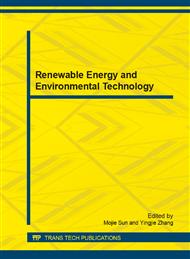[1]
L. He,T. Hou: Research on Environmental Performance Information Disclosure and Influence Factors—Evidence from China Listed Companies Corporate social responsible report. Chinese Journal of Population, Resources and Environment Vol. 20 No. 8: 99-104. (2010).
Google Scholar
[2]
M. Freedman, BJaggi: An Analysis of the Association between Pollution Disclosure and Economic Performance. Accounting, Auditing and Accountability Journal. v.
Google Scholar
[3]
F. K. Alnajjar: Determinants of social responsibility disclosures of U.S. Fortune 500 firms: An application of content analysis. Advances in Environmental Accounting & Management. No. 1: 163-200. (2000).
DOI: 10.1016/s1479-3598(00)01010-4
Google Scholar
[4]
Y. Tang, Z. Chen: Research on Impact of China listed Company Environmental Information Disclosure. Management WorldNo. 1: 158-159. (2006).
Google Scholar
[5]
J. Wang: Research on the Correlation among Environmental Information Disclosure, Industry Differences and Supervisory System. Accounting Research No. 6: 54-62. ( 2008).
Google Scholar
[6]
R. W. Roberts: Determinants of corporate social responsibility disclosure: An application of stakeholder theory. Accounting, Organizations and Society Vol. 17, No. 6: 595-612. (1992).
DOI: 10.1016/0361-3682(92)90015-k
Google Scholar
[7]
S. H. Chan: A stakeholder theory perspective to corporate environmental disclosures. The University of Queensland Dept. of Commerce. (1996).
Google Scholar
[8]
R. E. Freeman: Strategic Management: A Stakeholder Approach. (Pitman Publishing Inc, Boston 1984).
Google Scholar
[9]
C. Huang, F. Kung: Drivers of environmental disclosure and stakeholder expectation evidence from Taiwan. Accounting, Journal of Business EthicsVol. 95, No. 5: 435-451. (2010).
DOI: 10.1007/s10551-010-0476-3
Google Scholar
[10]
R. K. Mitchell, B.R. Agle, D. J. Wood: Toward a Theory of Stakeholder Identification and Salience: Defining the Principle of Who and What Really Counts. Academy of Management ReviewNo. 4: 853-886. (1997).
DOI: 10.5465/amr.1997.9711022105
Google Scholar
[11]
C. W. Hill, T. M. Jones: Stakeholder-Agency Theory. Journal of Management Studies Vol. 29 No. 2: 131-154. (1992).
Google Scholar
[12]
S. Brammer,S. Pavelin: Voluntary Environmental Disclosures by Large UK Companies. Journal of Business Finance & Accounting Vol. 33 No. 7: 1168-1188. (2006).
DOI: 10.1111/j.1468-5957.2006.00598.x
Google Scholar
[13]
M. Delmas, M. Toffel: Stakeholders and environmental management practices: an institutional framework. Business Strategy and the EnvironmentVol. 13 No. 4: 209-222. (2004).
DOI: 10.1002/bse.409
Google Scholar
[14]
E. Elijido-Ten, L. Kloot, P. Clarkson: Extending the application of stakeholder influence strategies to environmental disclosures-An exploratory study from a developing country. Accounting, Auditing & Accountability Journal Vol. 23 No. 8: 1032-1059. (2010).
DOI: 10.1108/09513571011092547
Google Scholar
[15]
L.L. Eng, Y.T. Mark: Corporate governance and voluntary disclosure. Journal of Accounting and Public PolicyNo. 22: 325-345. (2003).
Google Scholar
[16]
P. M. Healy, A. P. Hutton, K.G. Palepu: Stock performance and intermediation changes surrounding sustained increases in disclosure. Contemporary Accounting ResearchVol. 16 No. 3: 485-520. (1999).
DOI: 10.1111/j.1911-3846.1999.tb00592.x
Google Scholar
[17]
R. Webb, M. Beck: Problems and Limitations ofInstitutional Investor Participation inCorporate Governance. Corporate Governance: An International ReviewVol. 11 No. 1: 65-73. (2003).
DOI: 10.1111/1467-8683.00302
Google Scholar
[18]
A. A. Ullmann: Data in Search of a Theory: A Critical Examination of the Relationships Among Social Performance, Social Disclosure, and Economic Performance of U.S. Firms. Academy of Management ReviewVol. 10 No. 3: 540-557. (1985).
DOI: 10.5465/amr.1985.4278989
Google Scholar
[19]
T. Christopher, S. Hassan: Determinants of Voluntary Cash Flow Reporting: Australian Evidence. Accounting Research JournalNo. 19: 113-124. (1996).
Google Scholar


